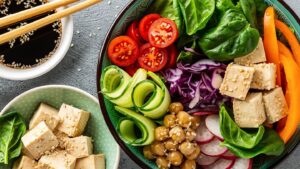The vegan diet has become increasingly popular in recent years, not only for ethical and environmental reasons, but also because of its potential health advantages, such as weight loss. In this step-by-step guide, we’ll cover everything you need to know about the vegan diet, its advantages, who might benefit, and a sample vegan meal plan to help you lose weight.
What is Vegan Diet?
A vegan diet is an eating food diet that is based on plant-based foods and does not include meat, dairy products, eggs, honey, etc. A vegan diet is mainly made up of fruits, veggies, grains, beans, nuts, seeds, etc. This dietary choice is often motivated by ethical concerns for animal welfare, environmental sustainability, and health reasons.
Vegan Food Benefits
The vegan diet offers numerous health benefits, including:
- Lower Risk of Chronic Diseases: Studies have shown that a vegan diet may lower the risk of chronic diseases such as heart disease, hypertension, type 2 diabetes, and certain cancers. This is attributed to the high intake of fruits, vegetables, whole grains, and legumes, which are rich in vitamins, minerals, fiber, and antioxidants.
- Weight Loss: Adopting a vegan diet can lead to weight loss due to its emphasis on whole, plant-based foods that are generally lower in calories and saturated fats compared to animal-based products. Additionally, plant-based diets are associated with improved satiety and reduced calorie intake, making weight management easier.
- Improved Digestive Health: The fiber-rich nature of plant-based foods can promote digestive health by preventing constipation, regulating bowel movements, and supporting a healthy gut microbiome. A vegan diet may also reduce the risk of gastrointestinal disorders such as diverticulosis and irritable bowel syndrome (IBS).
- Enhanced Nutrient Intake: A well-planned vegan diet can provide adequate levels of essential nutrients, including vitamins A, C, E, and K, folate, potassium, magnesium, and antioxidants. Plant-based foods are also naturally cholesterol-free and low in saturated fats, promoting heart health and overall well-being.
Who Should Use a Vegan Diet?
- The appeal of a vegan diet transcends demographic boundaries, attracting individuals from diverse backgrounds and motivations.
- Ethical concerns regarding animal welfare often drive individuals to embrace a vegan lifestyle, advocating for compassion and non-exploitation of animals.
- Environmental sustainability is another compelling reason for adopting a vegan diet, as it significantly reduces the ecological footprint associated with animal agriculture.
- Health considerations play a pivotal role in the decision to go vegan, with many recognizing the potential benefits for cardiovascular health, weight management, and disease prevention.
- Age is not a limiting factor for adopting a vegan diet, as people of all ages, from children to seniors, can thrive on a well-balanced plant-based diet.
- Athletes and fitness enthusiasts increasingly turn to veganism, recognizing its potential for enhancing performance, promoting recovery, and supporting overall well-being.
- Individuals with specific dietary needs or preferences, such as gluten-free or lactose intolerant individuals, may find the vegan diet accommodating and satisfying.
- Those seeking weight loss or overall health improvement often find success with a vegan diet, leveraging its nutrient-rich, fiber-dense foods to support their goals.
Vegan Diet Food List
When following a vegan diet, it’s essential to focus on consuming a variety of plant-based foods to ensure adequate nutrient intake. Here is a list of vegan foods to eat and avoid on a vegan diet:
Foods to Eat:
- Fruits: Apples, bananas, berries, oranges, grapes, etc.
- Vegetables: Leafy greens, broccoli, cauliflower, carrots, bell peppers, etc.
- Whole Grains: Quinoa, brown rice, oats, barley, bulgur, etc.
- Legumes: Lentils, chickpeas, black beans, kidney beans, tofu, tempeh, etc.
- Nuts and Seeds: Almonds, walnuts, chia seeds, flaxseeds, hemp seeds, etc.
- Plant-based Proteins: Seitan, soy products (tofu, tempeh, edamame), pea protein, etc.
- Healthy Fats: Avocado, olive oil, coconut oil, nuts, seeds, etc.
Foods to Avoid:
- Meat and Poultry: Beef, pork, chicken, turkey, etc.
- Dairy Products: Milk, cheese, yogurt, butter, etc.
- Eggs: Chicken eggs, quail eggs, duck eggs, etc.
- Honey: Bee-derived honey and other bee products.
- Processed Foods: Packaged snacks, processed meats, frozen meals, etc.
- Animal-Derived Additives: Gelatin, animal-based coloring agents, etc.
Try This Vegan Diet Meal Plan for Weight Loss
Here’s a sample vegan diet meal plan for weight loss:
Day 1:
1. Breakfast: Vegan overnight oats with almond milk, chia seeds, berries, and a sprinkle of cinnamon.
- Recipe: Start with a satisfying bowl of vegan overnight oats. Combine rolled oats with almond milk, chia seeds, a handful of berries, and a dash of cinnamon. Allow the mixture to sit overnight in the fridge for a convenient and nutritious morning meal.
2. Lunch: Quinoa salad with mixed greens, cherry tomatoes, cucumber, avocado, and a lemon-tahini dressing.
- Recipe: Quinoa salad is a great option for lunch. Mix quinoa in a bowl according to the package directions and let it sit for at least 30 minutes. Then toss with mixed greens and cherry tomatoes. Top with cucumber slices and diced avocado. Drizzle with lemon and Tahini dressing for a tangy flavor and creamy texture.
3. Dinner: Stir-fried tofu with broccoli, bell peppers, snap peas, and sesame-ginger sauce, served over brown rice.
- Recipe: For dinner, prepare a flavorful stir-fry featuring tofu and an array of colorful vegetables. Sauté tofu cubes with broccoli florets, sliced bell peppers, snap peas, and a savory sesame-ginger sauce. Serve the stir-fry over a bed of cooked brown rice for a wholesome and satisfying meal.
Day 2:
1. Breakfast: Green smoothie made with spinach, kale, banana, pineapple, and coconut water.
- Recipe: Kickstart your day with a refreshing green smoothie packed with nutrients. Blend together fresh spinach, kale, banana, pineapple chunks, and hydrating coconut water for a refreshing and energizing breakfast option.
2. Lunch: Lentil soup with carrots, celery, onion, garlic, and turmeric, served with whole-grain bread.
- Recipe: At lunchtime, enjoy a hearty bowl of lentil soup. Combine cooked lentils with carrots, celery, onion, minced garlic, and a pinch of turmeric for added flavor and anti-inflammatory benefits. Serve the soup with a side of whole-grain bread for a complete and filling meal.
3. Dinner: Vegan black bean tacos with corn tortillas, black beans, sautéed bell peppers and onions, avocado, salsa, and cilantro.
- Recipe: For dinner, indulge in vegan black bean tacos. Fill corn tortillas with seasoned black beans, sautéed bell peppers and onions, creamy avocado slices, zesty salsa, and a sprinkle of fresh cilantro for a flavorful and satisfying Mexican-inspired dish.
Day 3:
1. Breakfast: Vegan tofu scramble with diced vegetables (bell peppers, onions, mushrooms), spinach, and nutritional yeast.
- Recipe: Start your morning with a protein-packed vegan tofu scramble. Sauté diced vegetables such as bell peppers, onions, and mushrooms with crumbled tofu and nutritional yeast for a delicious and hearty breakfast option.
2. Lunch: Chickpea salad wrap with mashed chickpeas, diced vegetables, avocado, lettuce, and hummus, wrapped in a whole-grain tortilla.
- Recipe: For lunch, enjoy a chickpea salad wrap. Mash chickpeas with diced vegetables, creamy avocado, and a dollop of hummus, then wrap the mixture in a whole-grain tortilla for a portable and nutritious meal on the go.
3. Dinner: Vegan spaghetti with marinara sauce, lentil meatballs, and a side salad.
- Recipe: For dinner, savor a comforting bowl of vegan spaghetti with marinara sauce. Pair the spaghetti with homemade lentil meatballs for added protein and fiber, and serve alongside a fresh side salad dressed with your favorite vinaigrette. This meal is both satisfying and nourishing, perfect for a cozy evening at home.

The vegan diet offers numerous health benefits, including weight loss, improved heart health, lower risk of chronic diseases, and enhanced nutrient (Nutrition Diet) intake . By focusing on whole, plant-based foods and avoiding animal products, individuals can achieve their weight loss goals while promoting overall well-being. However, it’s essential to plan meals carefully to ensure adequate intake of essential nutrients such as protein, iron, calcium, vitamin B12, and omega-3 fatty acids. With proper planning and a variety of plant-based foods, the vegan diet can be a sustainable and effective approach to weight loss and long-term health.

